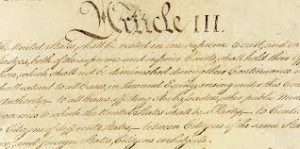 In a significant contribution to the Fifth Circuit’s case law applying Twombly and Iqbal, the Court reversed the Rule 12 dismissal of a products liability case in Flagg v. Stryker Corp., recognizing that “in products liability lawsuits, almost all of the evidence is in the possession of the defendant.” The defendants, manufacturers of toe implants, contended that Flagg’s allegations “lack . . .details about how the implants may have deviated from specifications and performance standards” and did not “sufficiently allege an existing and non-burdensome alternative design.” The Court found sufficient detail, for the pleading stage, in Flagg’s allegations that “the shape and sizing of the implants led to the implants’ fracturing and caused them to be difficult to remove once broken,” as well as his allegation that a different alloy would have performed better. It concluded: “Perhaps after discovery Flagg will not prevail, but at a pre-discovery stage of this case, in an area of law where defendants are likely to exclusively possess the information relevant to making more detailed factual allegations, we cannot say that he is merely on a fishing expedition.” No. 14-31169 (April 26, 2016, unpublished).
In a significant contribution to the Fifth Circuit’s case law applying Twombly and Iqbal, the Court reversed the Rule 12 dismissal of a products liability case in Flagg v. Stryker Corp., recognizing that “in products liability lawsuits, almost all of the evidence is in the possession of the defendant.” The defendants, manufacturers of toe implants, contended that Flagg’s allegations “lack . . .details about how the implants may have deviated from specifications and performance standards” and did not “sufficiently allege an existing and non-burdensome alternative design.” The Court found sufficient detail, for the pleading stage, in Flagg’s allegations that “the shape and sizing of the implants led to the implants’ fracturing and caused them to be difficult to remove once broken,” as well as his allegation that a different alloy would have performed better. It concluded: “Perhaps after discovery Flagg will not prevail, but at a pre-discovery stage of this case, in an area of law where defendants are likely to exclusively possess the information relevant to making more detailed factual allegations, we cannot say that he is merely on a fishing expedition.” No. 14-31169 (April 26, 2016, unpublished).
Monthly Archives: April 2016
 At issue in Hefren v. McDermott, Inc. was whether the Front Runner Spar (right) – a type of offshore drilling platform with a remarkable resemblance to a Jawan Sandcrawler – was “immovable” within the meaning of Louisiana law. A dispositive issue of limitations turned on that classification. Noting that the Spar could be moved with sufficient planning and preparation, the Fifth Circuit agreed with the district court that: “Like a ‘building’ under Louisiana law, there is ‘some permanence’ to the Front Runner Spar as it has not moved from its present location, is intended to remain there for its twenty year life, and has a permanent mooring system.” No. 15-30980 (April 25, 2016, unpublished).
At issue in Hefren v. McDermott, Inc. was whether the Front Runner Spar (right) – a type of offshore drilling platform with a remarkable resemblance to a Jawan Sandcrawler – was “immovable” within the meaning of Louisiana law. A dispositive issue of limitations turned on that classification. Noting that the Spar could be moved with sufficient planning and preparation, the Fifth Circuit agreed with the district court that: “Like a ‘building’ under Louisiana law, there is ‘some permanence’ to the Front Runner Spar as it has not moved from its present location, is intended to remain there for its twenty year life, and has a permanent mooring system.” No. 15-30980 (April 25, 2016, unpublished).
Last Friday, I spoke about recent federal cases on sanctions and professional responsibility issues; for some ethics CLE self-study, here is the handout that I used.
 The Texas Package Sales Association, a trade association of alcohol sellers, moved for relief under Fed. R. Civ. P. 60(b) from a longstanding injunction against the enforcement of a residency requirement for sales permits. The Fifth Circuit concluded:
The Texas Package Sales Association, a trade association of alcohol sellers, moved for relief under Fed. R. Civ. P. 60(b) from a longstanding injunction against the enforcement of a residency requirement for sales permits. The Fifth Circuit concluded:
- While not a plaintiff in the original litigation, TPSA had intervened in it, and could challenge the permanent injunction; and
- TPSA had standing as an organization to sue about the requirement; but
- Subsequent Supreme Court opinions about the Commerce Clause did not create an intervening change in the law that would justify Rule 60(b) relief original litigation; and
- TPSA had not adequately placed at issue the alternative ground for the injunction, based on the Privileges and Immunities Clause.
A dissent would not have found that TPSA had standing to sue, characterizing its suit as an effort “to substitute itself . . for the state authorities” with jurisdiction over the applicable law. Cooper v. TABC, No. 14-51343 (April 21, 2016).
 A magistrate judge ordered remand to state court in Davidson v. Georgia-Pacific. The Fifth Circuit concluded that because “a remand order is dispositive insofar as proceedings in the federal court are concerned,” it is “the functional equivalent of an order of dismissal.” Therefore, a magistrate judge could not make a final ruling on a motion to remand. In so holding, the Court “join[s] the uniform view of the courts of appeals that have considered this question[.]” No. 14-30925 (April 19, 2016).
A magistrate judge ordered remand to state court in Davidson v. Georgia-Pacific. The Fifth Circuit concluded that because “a remand order is dispositive insofar as proceedings in the federal court are concerned,” it is “the functional equivalent of an order of dismissal.” Therefore, a magistrate judge could not make a final ruling on a motion to remand. In so holding, the Court “join[s] the uniform view of the courts of appeals that have considered this question[.]” No. 14-30925 (April 19, 2016).
 Appellants, investors who lost money in their dealings with Allen Stanford, began a FINRA arbitration against Pershing LLC, a clearing broker. The panel rejected appellants’ $80 million claim, awarding only $10,000 in arbitration-related expenses. Pershing sought confirmation in federal court and encountered a split in authority about the amount-in-controversy requirement — the “demand” approach, which would allow jurisdiction, and the “award” approach, which would not. The Fifth Circuit sided with the “demand” approach, finding that it “recognizes the true scope of the controversy between the parties,” and was consistent with the corresponding test for claims filed in district court. A lengthy concurrence suggested that a “general approach” was not needed, given the different fact patterns that can give rise to this kind of dispute about the amount in controversy. Pershing LLC v. Kiebach, No. 15-30396 (April 6, 2016).
Appellants, investors who lost money in their dealings with Allen Stanford, began a FINRA arbitration against Pershing LLC, a clearing broker. The panel rejected appellants’ $80 million claim, awarding only $10,000 in arbitration-related expenses. Pershing sought confirmation in federal court and encountered a split in authority about the amount-in-controversy requirement — the “demand” approach, which would allow jurisdiction, and the “award” approach, which would not. The Fifth Circuit sided with the “demand” approach, finding that it “recognizes the true scope of the controversy between the parties,” and was consistent with the corresponding test for claims filed in district court. A lengthy concurrence suggested that a “general approach” was not needed, given the different fact patterns that can give rise to this kind of dispute about the amount in controversy. Pershing LLC v. Kiebach, No. 15-30396 (April 6, 2016).
 In July 2009, hail damaged the then-dormant Dallas Plaza Hotel (right), owned by Hamilton Properties. Hamilton inspected the property in November 2010, emailed an insurance agent in February 2011, and filed a claim in October 2011. The Fifth Circuit agreed that Hamilton had failed to give reasonably prompt notice, noting that it had no explanation for the long delay, and that while the insurer had been able to investigate the claim: “It is undisputed that because of Hamilton’s delay, AIC lost access to critical evidence, including the condition of the twelfth floor before and after the July hailstorm and up until the end of the coverage period.” Hamilton Properties, Inc v. American Ins. Co., No. 15-10382 (April 14, 2016, unpublished).
In July 2009, hail damaged the then-dormant Dallas Plaza Hotel (right), owned by Hamilton Properties. Hamilton inspected the property in November 2010, emailed an insurance agent in February 2011, and filed a claim in October 2011. The Fifth Circuit agreed that Hamilton had failed to give reasonably prompt notice, noting that it had no explanation for the long delay, and that while the insurer had been able to investigate the claim: “It is undisputed that because of Hamilton’s delay, AIC lost access to critical evidence, including the condition of the twelfth floor before and after the July hailstorm and up until the end of the coverage period.” Hamilton Properties, Inc v. American Ins. Co., No. 15-10382 (April 14, 2016, unpublished).
 The plaintiffs in Wendt v. 24 Hour Fitness USA, Inc. complained about several violations of the Texas Health Spa Act in the form membership contract of 24 Hour Fitness. Noting the specific remedies provided by that Act, the Fifth Circuit held: “We agree with the district court that Plaintiffs suffered no injury-in-fact. 24 Hour’s alleged violations of the Act did not harm Plaintiffs in any way. To the contrary, 24 Hour gave Plaintiffs exactly what they paid for: access to a gym. Plaintiffs therefore lack Article III standing, and the district court
The plaintiffs in Wendt v. 24 Hour Fitness USA, Inc. complained about several violations of the Texas Health Spa Act in the form membership contract of 24 Hour Fitness. Noting the specific remedies provided by that Act, the Fifth Circuit held: “We agree with the district court that Plaintiffs suffered no injury-in-fact. 24 Hour’s alleged violations of the Act did not harm Plaintiffs in any way. To the contrary, 24 Hour gave Plaintiffs exactly what they paid for: access to a gym. Plaintiffs therefore lack Article III standing, and the district court
properly dismissed the case.” No. 15-10309 (April 13, 2016).
 The parties in DFW Airport Board v. Inet Aiport Systems sued each other about problems in the installation of rooftop air conditioning units. Key issues were “who breached first” and whether the parties had a meeting of the minds about a solution; the evidence consisted of a fast-moving, complicated exchange of emails and letters. The Fifth Circuit reversed a summary judgment, noting: “In these circumstances the Contract required both parties to participate in resolving defects. Any contractual modification or change order required the mutual assent of the parties, and questions of mutual assent are fact based. Sifting through the evidence to determine whether the parties reached agreement on a contractual modification is a task ill-suited for summary judgment on this record.” Nos. 15-10390, 15-10600 (April 12, 2016).
The parties in DFW Airport Board v. Inet Aiport Systems sued each other about problems in the installation of rooftop air conditioning units. Key issues were “who breached first” and whether the parties had a meeting of the minds about a solution; the evidence consisted of a fast-moving, complicated exchange of emails and letters. The Fifth Circuit reversed a summary judgment, noting: “In these circumstances the Contract required both parties to participate in resolving defects. Any contractual modification or change order required the mutual assent of the parties, and questions of mutual assent are fact based. Sifting through the evidence to determine whether the parties reached agreement on a contractual modification is a task ill-suited for summary judgment on this record.” Nos. 15-10390, 15-10600 (April 12, 2016).
 Mutual of Omaha obtained a summary judgment against Prospect, who complained under Fed. R. Civ. P. 56(d) that it needed “additional electronic discovery related to allegedly backdated documents produced by Mutual.” The Fifth Circuit declined to enter that wild kingdom, observing: “[T]he magistrate judge denied Prospect’s motion to compel that electronic discovery, and Prospect did not object to the denial. That means that the electronic discovery was not ‘susceptible of collection within a reasonable time frame’ —Prospect was never
Mutual of Omaha obtained a summary judgment against Prospect, who complained under Fed. R. Civ. P. 56(d) that it needed “additional electronic discovery related to allegedly backdated documents produced by Mutual.” The Fifth Circuit declined to enter that wild kingdom, observing: “[T]he magistrate judge denied Prospect’s motion to compel that electronic discovery, and Prospect did not object to the denial. That means that the electronic discovery was not ‘susceptible of collection within a reasonable time frame’ —Prospect was never
going to get it—so it cannot support Prospect’s Rule 56(d) motion.” Prospect Capital v. Mutual of Omaha, No. 15-20345 (April 13, 2016).
 In Burell v. Prudential Ins. Co., the Fifth Circuit addressed one of the many ERISA summary judgment cases in which it reviews a plan administrator’s work for abuse of discretion – or, in the somewhat cryptic language of ERISA: “our de novo review of [the] summary judgment ruling will also apply the abuse of discretion standard.” The panel affirmed over a dissent, which is not typical in such cases. It noted disagreement among the doctors who reviewed the claim, as well as allegations that the administrator did not follow its own review procedures, and would have found a fact issue for trial based on those matters. No. 15-50035 (April 11, 2016).
In Burell v. Prudential Ins. Co., the Fifth Circuit addressed one of the many ERISA summary judgment cases in which it reviews a plan administrator’s work for abuse of discretion – or, in the somewhat cryptic language of ERISA: “our de novo review of [the] summary judgment ruling will also apply the abuse of discretion standard.” The panel affirmed over a dissent, which is not typical in such cases. It noted disagreement among the doctors who reviewed the claim, as well as allegations that the administrator did not follow its own review procedures, and would have found a fact issue for trial based on those matters. No. 15-50035 (April 11, 2016).
 The issue in Seacor Holdings v. Mason was whether a party had “informally” opted out of a class action related to the Deepwater Horizon disaster. Acknowledging that a party can opt out of a class without strictly complying with specified procedures, especially if the party is unsophisticated and unrepresented by legal counsel, the Fifth Circuit found no abuse of discretion in not finding an opt-out here. “The gargantuan size and extraordinary complexity of this litigation therefore supports the district court’s decision. . . . . When the district court approved the Agreement, it noted the class had potentially 200,000 members and that over 1,700 individuals sent opt-out requests to the claims administrator. Given the size and complexity of this MDL proceeding, the court and parties should not have to intuit an opt out from vague statements made in one of thousands of filings before the court. To hold otherwise would allow class members to make ambiguous statements and motions while waiting to see if the outcome of the class action is favorable.” No. 15-30597 (April 6, 2016).
The issue in Seacor Holdings v. Mason was whether a party had “informally” opted out of a class action related to the Deepwater Horizon disaster. Acknowledging that a party can opt out of a class without strictly complying with specified procedures, especially if the party is unsophisticated and unrepresented by legal counsel, the Fifth Circuit found no abuse of discretion in not finding an opt-out here. “The gargantuan size and extraordinary complexity of this litigation therefore supports the district court’s decision. . . . . When the district court approved the Agreement, it noted the class had potentially 200,000 members and that over 1,700 individuals sent opt-out requests to the claims administrator. Given the size and complexity of this MDL proceeding, the court and parties should not have to intuit an opt out from vague statements made in one of thousands of filings before the court. To hold otherwise would allow class members to make ambiguous statements and motions while waiting to see if the outcome of the class action is favorable.” No. 15-30597 (April 6, 2016).
 “Here, the appellants’ notice of appeal specifically designated only the district court’s September 17, 2015, order granting summary judgment for appeal, and it reveals no implied challenge to the magistrate judge’s May 2015 ruling on their motion to reset deadlines or the district court’s August 2015 ruling on their motion for an extension of time. These unmentioned orders therefore fall outside the scope of the appellants’ notice of appeal, and we lack jurisdiction to review them.” Underwood v. General Motors, No. 15-30831 (April 5, 2016, unpublished).
“Here, the appellants’ notice of appeal specifically designated only the district court’s September 17, 2015, order granting summary judgment for appeal, and it reveals no implied challenge to the magistrate judge’s May 2015 ruling on their motion to reset deadlines or the district court’s August 2015 ruling on their motion for an extension of time. These unmentioned orders therefore fall outside the scope of the appellants’ notice of appeal, and we lack jurisdiction to review them.” Underwood v. General Motors, No. 15-30831 (April 5, 2016, unpublished).
 The attorney general of Mississippi served Google with a broad administrative subpoena about Google’s efforts to reduce copyright infringement, drug trafficking, and other undesirable uses of its search technology. Google responded with a federal lawsuit seeking an injunction against the subpoena and further proceedings about it. The Fifth Circuit found federal jurisdiction, as “Google’s claims seeking to enjoin a state officer’s alleged violations of federal law invoke federal-question jurisdiction,” and found no reason to abstain under Younger v. Harris. But the Court went on to find that the action was not yet ripe: “there is no current consequence for resisting the subpoena and the same challenges raised in the federal suit could be litigated in state court.” Google, Inc. v. Hood, No. 15-60205 (April 8, 2016). Accordingly, it vacated the injunction granted by the trial court, and remanded with instructions to dismiss.
The attorney general of Mississippi served Google with a broad administrative subpoena about Google’s efforts to reduce copyright infringement, drug trafficking, and other undesirable uses of its search technology. Google responded with a federal lawsuit seeking an injunction against the subpoena and further proceedings about it. The Fifth Circuit found federal jurisdiction, as “Google’s claims seeking to enjoin a state officer’s alleged violations of federal law invoke federal-question jurisdiction,” and found no reason to abstain under Younger v. Harris. But the Court went on to find that the action was not yet ripe: “there is no current consequence for resisting the subpoena and the same challenges raised in the federal suit could be litigated in state court.” Google, Inc. v. Hood, No. 15-60205 (April 8, 2016). Accordingly, it vacated the injunction granted by the trial court, and remanded with instructions to dismiss.
 Appellant “Why Not LLC” (unfortunately, not the appellee, despite the perfect name for that side of an appeal) complained of a frozen yogurt franchise termination by Yumilicious. The district court granted summary judgment on Why Not’s many causes of action, and the Fifth Circuit affirmed, principally on grounds relating to Yumilicious’s lack of intent and the terms of the franchise agreement. In the course of doing so, the opinion offers a primer on commonly-litigated issues about basic business torts in Texas. The Court observed that Why Not’s pleading had presented “a large serving of claims and counterclaims piled precariously together,” and concluded: “This saccharine swirl of counterclaims suggests that litigants, like fro-yo fans, should seek quality over quantity.” Yumilicious v. Barrie, No. 15-10508 (April 6, 2016). (The opinion is silent as to whether Why Not has any relation to the left fielder on Bud Abbott’s famous baseball team.)
Appellant “Why Not LLC” (unfortunately, not the appellee, despite the perfect name for that side of an appeal) complained of a frozen yogurt franchise termination by Yumilicious. The district court granted summary judgment on Why Not’s many causes of action, and the Fifth Circuit affirmed, principally on grounds relating to Yumilicious’s lack of intent and the terms of the franchise agreement. In the course of doing so, the opinion offers a primer on commonly-litigated issues about basic business torts in Texas. The Court observed that Why Not’s pleading had presented “a large serving of claims and counterclaims piled precariously together,” and concluded: “This saccharine swirl of counterclaims suggests that litigants, like fro-yo fans, should seek quality over quantity.” Yumilicious v. Barrie, No. 15-10508 (April 6, 2016). (The opinion is silent as to whether Why Not has any relation to the left fielder on Bud Abbott’s famous baseball team.)
 A clear disability — a child rendered incompetent by a debilitating medical condition — gave rise to complicated standing and capacity issues in Rideau v. Keller ISD, No. 15-10095 (April 5, 2016). The child, the beneficiary of a trust established in his behalf as a result of the incident that caused his condition, sought damages from his school district for mistreatment by his special education teacher. The Fifth Circuit found that the child had standing to seek recovery for his home care expenses, notwithstanding “[t]he existence of a third-party payor in the form of a trust created by a prior tortfeasor.” The Court then agreed with the defendant that Texas law gave the bank who administered the child’s trust the exclusive right to file suit for other damages, and not his parents. It concluded, however, that this problem had been cured by the bank’s ratification of the parents’ action under the rarely-applied but very practical Fed. R. Civ. P. 17(a)(3). (I congratulate my LPCH colleague John Guild on his work for the plaintiffs in this case.)
A clear disability — a child rendered incompetent by a debilitating medical condition — gave rise to complicated standing and capacity issues in Rideau v. Keller ISD, No. 15-10095 (April 5, 2016). The child, the beneficiary of a trust established in his behalf as a result of the incident that caused his condition, sought damages from his school district for mistreatment by his special education teacher. The Fifth Circuit found that the child had standing to seek recovery for his home care expenses, notwithstanding “[t]he existence of a third-party payor in the form of a trust created by a prior tortfeasor.” The Court then agreed with the defendant that Texas law gave the bank who administered the child’s trust the exclusive right to file suit for other damages, and not his parents. It concluded, however, that this problem had been cured by the bank’s ratification of the parents’ action under the rarely-applied but very practical Fed. R. Civ. P. 17(a)(3). (I congratulate my LPCH colleague John Guild on his work for the plaintiffs in this case.)
 The plaintiffs in Hall v. Phenix Investigations were also defendants in contentious state court fraudulent transfer litigation. They alleged that a private investigation firm violated the FCRA in its work in that litigation. The Fifth Circuit affirmed the dismissal of the case on the pleadings, finding that “the report was commissioned for use in ongoing commercial litigation, which is not a qualifying purpose of the FCRA even it may potentially be used for such a purpose someday. And, “[e]ven assuming that filing a lawsuit to collect on a judgment could constitute the collection of a consumer account within the meaning of the FCRA, there is no collection of a consumer account here because the judgment arose from a commercial transaction.” No. 15-10533 (March 29, 2016, unpublished).
The plaintiffs in Hall v. Phenix Investigations were also defendants in contentious state court fraudulent transfer litigation. They alleged that a private investigation firm violated the FCRA in its work in that litigation. The Fifth Circuit affirmed the dismissal of the case on the pleadings, finding that “the report was commissioned for use in ongoing commercial litigation, which is not a qualifying purpose of the FCRA even it may potentially be used for such a purpose someday. And, “[e]ven assuming that filing a lawsuit to collect on a judgment could constitute the collection of a consumer account within the meaning of the FCRA, there is no collection of a consumer account here because the judgment arose from a commercial transaction.” No. 15-10533 (March 29, 2016, unpublished).
In the second case in a week about the seizure of maritime fuel supplies, the Fifth Circuit addressed a recurring issue in international business transactions — the incorporation of a  general set of standards by reference in a less-detailed, but party-specific contract. Applying Singapore law to the substantial fuel bunkers of the M/V BULK JULIANA (right), the Court concluded: “Although [the expert’s] testimony did not address the bunker delivery notes, he affirmed the incorporation of the General Terms by reference to the bunker confirmation email, which provided all the relevant terms and conditions of the contract. We recognize that neither Bulk Juliana nor the vessel was a party to the bunker confirmation email, and therefore did not have
general set of standards by reference in a less-detailed, but party-specific contract. Applying Singapore law to the substantial fuel bunkers of the M/V BULK JULIANA (right), the Court concluded: “Although [the expert’s] testimony did not address the bunker delivery notes, he affirmed the incorporation of the General Terms by reference to the bunker confirmation email, which provided all the relevant terms and conditions of the contract. We recognize that neither Bulk Juliana nor the vessel was a party to the bunker confirmation email, and therefore did not have  access to and/or awareness of the specific document at all material times. [The expert], however, testified about the ready availability of the contractual terms via the internet, as well as the prevalence of the practices employed here with respect to sales of necessaries in the shipping industry. Importantly, [he] pointed out that [Plaintiff’s] incorporation of the General Terms was ‘commonplace in the bunkering industry worldwide, and ought to be in the contemplation of ship operators and ship-owners such as [Bulk Juliana].'” World Fuel Services v. Bulk Juliana, Ltd., No. 15-30239 (April 1, 2016).
access to and/or awareness of the specific document at all material times. [The expert], however, testified about the ready availability of the contractual terms via the internet, as well as the prevalence of the practices employed here with respect to sales of necessaries in the shipping industry. Importantly, [he] pointed out that [Plaintiff’s] incorporation of the General Terms was ‘commonplace in the bunkering industry worldwide, and ought to be in the contemplation of ship operators and ship-owners such as [Bulk Juliana].'” World Fuel Services v. Bulk Juliana, Ltd., No. 15-30239 (April 1, 2016).
 After a bad start in the Fifth Circuit, the Golf Channel ultimately prevailed in the Texas Supreme Court in a fraudulent transfer case against the Allen Stanford receiver. The Channel ran advertisements for Stanford’s golf business in exchange for payments of roughly $6 million. The issue was whether the “value” of those ads, for purposes of the Channel’s defenses under TUFTA, “became valueless based on the true nature of the debtor’s business as a Ponzi scheme or the debtor’s subjective reasons for procuring otherwise lawful services.” The Texas Supreme Court ruled for the Channel, finding that “TUFTA does not contain separate standards for assessing ‘value’ and ‘reasonably equivalent’ value based on whether the debtor was operating a Ponzi scheme. . . . “[V]alue must be determined objectively at the time of the transfer and in relation to the individual exchange at hand rather than viewed in the context of the debtor’s entire enterprise, . . . the debtor’s perspective, or . . . a retrospective evaluation of the impact it had on the debtor’s estate.” Janvey v. Golf Channel, No. 15-0489 (Tex. Apr. 1, 2016).
After a bad start in the Fifth Circuit, the Golf Channel ultimately prevailed in the Texas Supreme Court in a fraudulent transfer case against the Allen Stanford receiver. The Channel ran advertisements for Stanford’s golf business in exchange for payments of roughly $6 million. The issue was whether the “value” of those ads, for purposes of the Channel’s defenses under TUFTA, “became valueless based on the true nature of the debtor’s business as a Ponzi scheme or the debtor’s subjective reasons for procuring otherwise lawful services.” The Texas Supreme Court ruled for the Channel, finding that “TUFTA does not contain separate standards for assessing ‘value’ and ‘reasonably equivalent’ value based on whether the debtor was operating a Ponzi scheme. . . . “[V]alue must be determined objectively at the time of the transfer and in relation to the individual exchange at hand rather than viewed in the context of the debtor’s entire enterprise, . . . the debtor’s perspective, or . . . a retrospective evaluation of the impact it had on the debtor’s estate.” Janvey v. Golf Channel, No. 15-0489 (Tex. Apr. 1, 2016).